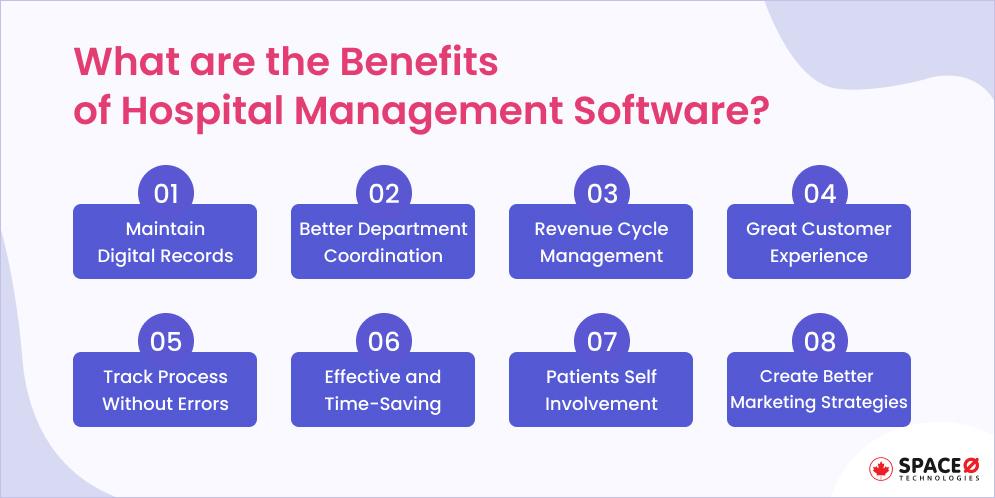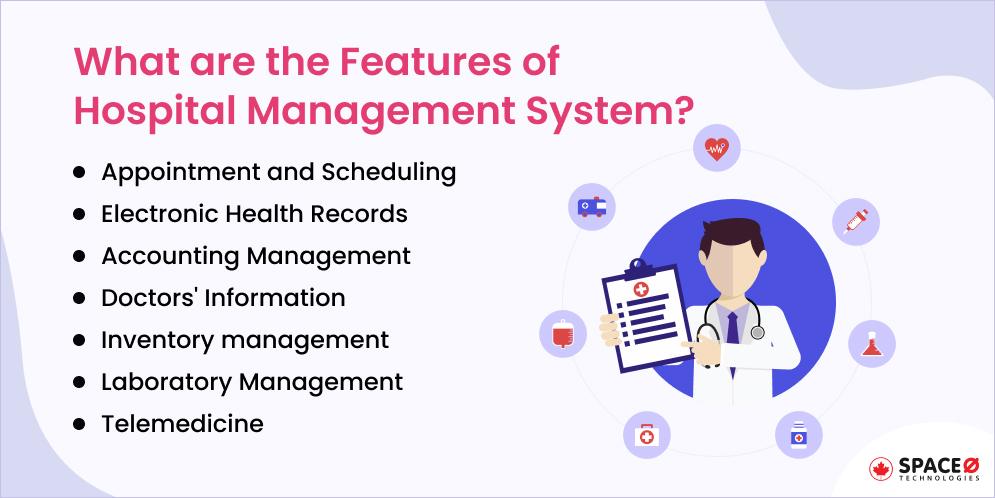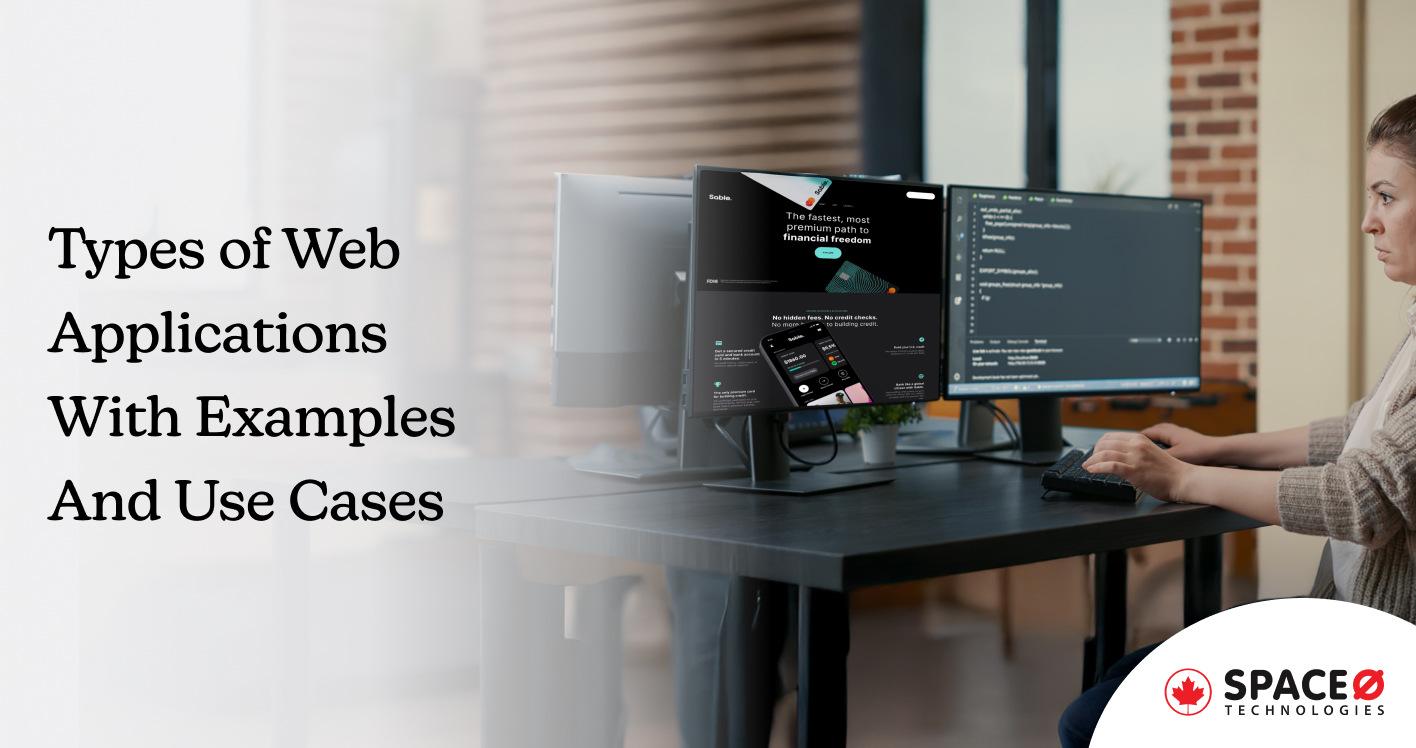
What is a Hospital Management System? How Does It Work?
According to the report of Statista, in 2013, the global healthcare data was about 153 exabytes of global hospitals and it was increased to 2,314 exabytes in the year 2020.
Can you imagine how rapidly healthcare institutes developed over the last seven years?
Though, some problems like healthcare cost, managing staff, and equipment management require your attention as these problems consume your huge time.
Being a doctor or a technician head in any leading hospital, you must be facing the above problems and looking for the best possible solution. Isn’t it? The solution is an advanced hospital information management system that streamlines clinical processes. It also overcomes the co-workers’ efficiency in work and enables hospitals to run effectively.
In this blog, we have covered all you need to know about the hospital management system. So, let’s get started.
Table of Contents
What is a Hospital Management System?

Hospital management system is the computer-based application used to manage all the hospital operations, including clinical processes, administrations, legal compliance, health records, and medical.
The smart hospital management software also helps you in reducing operational costs and provides better coordination across various departments such as:
- O.T. Management
- Diagnostic & Laboratory Management
- Appointment Details & Pharmacy
- Ambulance Service Management
- Discharge Summary & Feedback
- Accounting & Medical Equipment Management
- Business Intelligence & Blood Bank
- HR Payroll
To be precise, the hospital management system enables your medical staff to manage all the essential activities like communication with patients, task execution, and maintaining financial resources in a streamlined way. Additionally, it also keeps the entire record of your patient from appointment to a medical discharge for healthcare providers.
What are the Benefits of Hospital Management System?

As we’ve seen above, the use and importance of a hospital information system improves administration work and helps to deliver better treatment facilities by your hospital staff. Here are the advantages of a hospital management system.
Maintain Digital Records
The HMS helps healthcare centers to manage the patient’s information (name, health issues, address, phone number, disease history, test results) as digital records in a single database. It escalates the process of manual management of paperwork and the traditional way of keeping patient medical records. The use of an online patient management system allows your hospital staff to easily retrieve the patient’s information effortlessly with the features offered in the application.
Better Department Coordination
In hospitals, several departments require efforts to build proper coordination with each of the departments. To make the management simpler, HMS helps in making the proper flow of all the services. Most of the hospital management system software is capable of managing,
- Resources
- Analyze work of staff
- Reduce downtime in equipment
- Enhancing the supply chain
As said above, through digital records of patients, there is transparency in the work of all departments, which results in a reduction in cost, better teamwork, and fewer paperwork processes.
Revenue Cycle Management
The hospital management application makes it easier to manage the finances of the hospital. It is easy to manage different financial operations with its insights, including monthly or daily expenses, paying bills, discharged patients’ accounts, and sending alerts if there are any payment dues. Appropriate management of financial things leads you in the right direction with better results in business prospects.
Great Customer Experience
A clinic management software offers 24/7 online assistance to the patients. HMS can guide the patients during registration and assist them in emergencies, such as providing contact information of nearest ambulance, providing cost of reports, providing navigation in the system, etc.
Once appointments are scheduled, doctors can give more time to the examination process of patients. While diagnoses, if doctors require any information it becomes easier to access online. Such a streamlined approach enables your patients to have great experiences.
Track Process Without Errors
Using a manual system is a traditional approach and there are chances of errors in the manual system. However, using an automated management system decreases chances of the errors and simplifies the process of tracking.
With hospital management application, you can easily track all the services at your fingertips, including room occupancy, staff availability details, and other operational information. In addition, the system is interlinked in a way that when a patient gets discharged, the system automatically increases the bed number and staff availability.
Effective and Time-Saving
Using a hospital database management system saves your time by reducing paperwork, file management, manual registrations of patients, and patient record files. With the use of an application, you can effortlessly access and manage the data of patients.
Furthermore, it creates a positive experience for patients and reduces wastage of time with the help of a systematic approach to overcome any problems. Moreover, in a few taps, healthcare professionals can check the patient information as well as have access to employee and patient activities remotely.
Patients Self Involvement
With the online hospital management system, allow your patients to book an appointment with any specific doctor using the patient portal. It, in fact, helps your patients to reschedule the meeting and provide assistance in an emergency. In addition, your patients can easily access their reports and clinical history and know the status of their lab reports to avoid any unnecessary wastage of time.
Create Better Marketing Strategies
The HMS not only helps in hospital functioning but also helps to create the right marketing strategies for better marketing campaigns. This ultimately leads to building better relationships between patients, vendors, suppliers, and marketing services agencies.
Want to implement an HMS solution to streamline your hospital process?
Our expert developers will guide you.

How Hospital Management System Works?

Automation helps doctors manage crucial tasks and eradicate unnecessary human errors from the process, resulting in better clinical work and several functions.
HMS application deals with different things which come under the healthcare industry and provides a systematic approach to tackle the difficulties that might occur in the future. It also helps the administration department manage the general processes, healthcare services and send regular alerts to users and equipment suppliers on various substances. In a nutshell, a web-based hospital management system automates the clinical processes and enhances the usage of resources.
Now, let’s understand how it works and how it makes the tiring procedure smoother.
Patient Registration and Appointment
In the first step, patients register themselves to book an appointment with a doctor. There are various ways your patients can book an appointment. First, a patient calls the receptionist to schedule an appointment, and the receptionist will check the available slot using hospital management software to book an appointment. Another way is to visit the hospital’s online patient portals through HMS and book an available slot under the patient registration section.
Consulting A Doctor Through Appointment
When your patient arrives on the scheduled date, they meet the doctor for the consultation. Then the doctor checks the patient’s medical records through HMS. That helps doctors conduct a proper diagnosis and mention medical tests, if any, to see further analysis.
Medical Test Results
After consultation, your patients can go for medical tests if required. Once the reports arrive, lab staff upload them directly in HMS so that doctors check them in HMS only. Hence, it removes the misplacement of any severe patient’s critical reports, which can be a big problem, right? To avoid such errors, hospital management software comes into existence.
Diagnosis and Treatment
Depending on the diagnosis and the new medical test reports, a doctor further provides a prescription to the patient. Additionally, it becomes easier for doctors to add new details to the patient’s profile using HMS. If the diagnosis is critical and the patient needs to get indoor, then all the formalities will be performed as per the procedure with the help of a medical practice management system (HMS).
With the use of HMS, doctors can access all the data about the bed availability, staff information, treatment requirements and perform all the necessary steps in HMS for building better coordination. On the other hand, if the checkup is routine and diagnosis is not critical, the patient gets a bill.
Accounting Process
In this step, the patient pays the cost of the treatment at the accounting department. Then, the accounting department charges the patient according to the treatment given to the patient. If the patient has insurance, then the process is conducted according to that. Otherwise, after paying fees, the patient data is updated in the database.
What are the Features of Hospital Management System?

Appointment Scheduling
Scheduling an appointment is one of the essential hospital information system features. It allows patients and hospital staff to manage the meetings of the doctor efficiently. Through this feature, patients will be able to access the below facilities:
- Check available time slots
- Register appointment with a doctor
- Get a notification if other slots get open up
Electronic Health Records
An EHR is a system used to store patients’ data digitally. It allows you to keep the electronic medical record of patients in a single place and accessible at any time. Manual management of the patient’s medical history takes away an enormous amount of time and includes the risk of errors. While in HMS, a doctor can make notes of the patient in the electronic health record system.
Enabling the sharing of patients’ health data through EHR helps other medical departments such as labs, or pharmacies. The hospital information system allows access to all the details of the patient to the doctor, such as medical records, lab reports, prescriptions, therapy, and appointment scheduling. Hence, it becomes easier for doctors to make decisions based on patients’ health records.
Accounting Management
In hospital management applications, finance and billing are the crucial parts of the hospital. The system helps manage all financial transactions and finance operations, including revenues, taxes, patient bills, laboratory bills, and medical bills and costs.
One of the features is the automatic calculation of medication cost and track of patients’ billing. It’s beneficial to provide the cost of the possible services while booking an appointment so your patients have an idea of likely costs. Additionally, your patients can download the bills and receipts against the services they’ve received with the corresponding payments.
Doctors’ Information
Having convenient access to doctor’s information in a custom hospital management system helps patients to get required details quickly. In addition, this feature will allow patients to learn about doctors’ expertise and experience. Don’t you think providing such info will build the authority of your hospital?
Inventory management
In healthcare organizations, enough supplies are necessary to execute the day-to-day tasks smoothly, and there is no room for a shortage. Hence, the hospital management application helps you manage and monitor the supply of the stock and when the re-stocking will be needed. In addition, it also helps you to check the expiry of the drugs.
Laboratory Management
Once the lab report results arrive, delivering them via software is the fastest way just by including it in the patient’s profile. A notification through software provides updates to the doctor and patient to access it at any time. Managing the manual records could be complex and there are chances of misplacement of documents. However, In HMS you just need to upload it once and it will always be available.
Telemedicine
The telemedicine application brings relief for the patients who can’t travel or visit the doctor’s clinic or hospital. Through virtual meetings with the consultants, patients get online medication suggestions at their homes. In addition, it saves time for doctors because they don’t require to travel to the patient’s home to check him/her.
Telemedicine application allows patients to book a virtual appointment with the doctor in the available slot. As the patient’s history is already present in the software, it also becomes feasible for the doctor to access the data in hospital software.
- Market Research
- Ideation and Implementation
- Identification of Important Features
- Design and Prototype
- Find a software development company
- Book Appointments
- Online/Offline Billing Facility
- Doctor’s Information
- Access to Medical History of Patient
- Treatment Records
- Emergency Support
Doctors can directly schedule the next appointment for a patient during the patient’s ongoing visit. Once the appointment is scheduled, an SMS can be sent to the doctor and patient before the upcoming appointment.
Looking to make a custom HMS for your healthcare organization, don’t know what to do further?
Apply for a free thirty minutes consultation.
FAQ About Hospital Management Software
How to build a hospital management system with MVP features?
To develop a custom hospital management system with the MVP modules. Below are the steps which will help you to make software with the necessary features,
How do you build a hospital management system?
Building hospital management applications are crucial for managing the hospital task smoothly. First, identify the needs of your hospital to develop a hospital management system as per your requirements. Then, as per requirements, you can hire a hospital management software development company to develop your customized HMS solutions.
What is the user requirement of a hospital management system?
There can be several user requirements in the HMS. Some of the general conditions are described below,
What are the modules in the hospital management system?
HMS, aka clinic management system, includes various program modules designed to provide an adequate and appropriate healthcare facility. It contains modules and clinic management system features such as book appointments, laboratory results, medical history, drug information, staff availability, accounting, billing, and stock management.
Why is a hospital management system required?
The HMS is built to optimize and digitize the process in the hospital for better coordination. It allows managing the staff and various necessary stuff required in hospitals. These hospital management systems help management personnel to provide better and faster healthcare systems for effective treatments. Additionally, it helps to improve the healthcare facilities of hospitals.
Build Your Hospital Management Software
In our verdict, we can say that hospital management system software is becoming an impactful digital solution to enrich healthcare centers. It allows you to manage all the processes with a meticulous approach that streamlines activities for patients. Furthermore, HMS helps hospital authorities in making strategic decisions to execute day-to-day procedures adequately.
We’ve covered all the aspects in this blog about hospital management software systems that deliver perfection at your end with effective results.
Want to implement the clinic management system in your hospital? We have an expert team of designers and developers to help you create an automated system for your hospital. You can connect with us today by filling our contact form; we will be back to you within 72 hours.

Want to Develop a Custom HMS Solution?
Editor's Choice

10 Types of Web Applications With Real-World Examples And Use Cases

Top 10 Ruby on Rails Development Companies in 2025

Top 10 Node.js Development Companies in 2025
All our projects are secured by NDA
100% Secure. Zero Spam
*All your data will remain strictly confidential.
Trusted by


Bashar Anabtawi
Canada
“I was mostly happy with the high level of experience and professionalism of the various teams that worked on my project. Not only they clearly understood my exact technical requirements but even suggested better ways in doing them. The Communication tools that were used were excellent and easy. And finally and most importantly, the interaction, follow up and support from the top management was great. Space-O not delivered a high quality product but exceeded my expectations! I would definitely hire them again for future jobs!”

Canada Office
2 County Court Blvd., Suite 400,
Brampton, Ontario L6W 3W8
Phone: +1 (437) 488-7337
Email: sales@spaceo.ca

